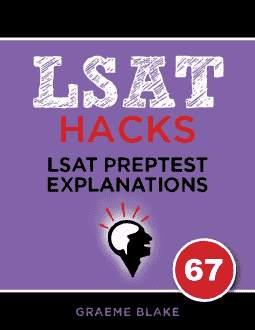QUESTION TEXT: In a medical study of all of the residents of…
QUESTION TYPE: Flawed Reasoning
CONCLUSION: Many residents don’t remember asking their doctor about severe headaches.
REASONING: 35 people reported asking doctors, but doctors reported 105 visits.
ANALYSIS: There are many other possible reasons why the numbers don’t match.
- Maybe people saw their doctor more than once.
- Maybe doctors’ records are inaccurate.
- Maybe people lied and didn’t want to admit they suffer from headaches.
The right answer uses the first reason.
Watch out – questions often pretend that two things are the same when they’re not. The first number is the number of people who reported visits. The second number is the number of visits. People aren’t visits.
Most of the wrong answers only make sense if you completely misunderstand the situation. For any question, if you’re confused by the situation in the stimulus, reread it. Wrong answers are always designed to further confuse.
___________
- Read the first sentence. The study surveyed all residents. That’s the best possible sample.
- This would make the situation even stranger. The dilemma is that doctors reported 105 visits from residents, while only 35 people went to see their doctor. If some of those people went outside Groverhill, then there’s an even bigger gap.
- CORRECT. If some residents saw their doctors multiple times about headaches, then that could explain the discrepancy.
- The argument didn’t make this claim. It just said there was a discrepancy between the number of residents who saw their doctor and the number of visits.
- Who cares about people who didn’t see their doctor? The argument is talking about people who did go see their doctor.


Hi Graeme, first time commenting here. Your LSAThacks resource has been incredibly helpful in my studies.
I answered C for the same reasons mentioned in your explanation. However, the word “consultations” through me off a bit as a consultation implies a first time visit for a matter rather than a recurring visit to follow up on said matter. I can imagine I’m not the only one who thought this while reading the question. Despite that linguistics faux pas, this is clearly the most sensible answer.
Ah. So a consultation actually doesn’t imply a first visit. It’s nowhere in the definition, which is: ” a meeting with an expert or professional, such as a medical doctor, in order to seek advice”
Now in practice many professionals offer a “free initial consultation” before a paid service. But the fact that we use a limited range of a word doesn’t make that hte full definition of a word.
In the medical context consultation is commonly used. For example, you may have heard the phrase “please consult with a medical professional prior to starting a new exercise program”. It’s just a fancy way of saying “talk to your doctor!”. Consultation is a more formal style of speech.
Whenever you find the LSAT’s word choice to be strange, it’s a good idea to check the dictionary. Oftentimes the LSAT uses words precisely correctly, while we only use a portion of their definition. Oxford is my top choice, I find it handles these precise cases better than Merriam. Hope that helps!